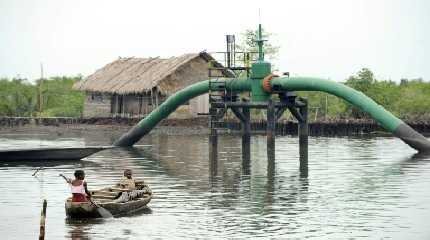
ABUJA, Nigeria (AP) — Nigeria is losing 470,000 barrels of crude oil per day to theft and pipeline vandalism, regulators say, and has now lost its status as Africa’s largest crude producer to Angola.
With the decline, Nigeria has dropped to fourth place among Africa’s largest crude-producing countries, according to the International Energy Agency’s latest oil market report released this week.
The problem is also making it more difficult for Nigeria to meet the 1.8 million barrels per day (bpd) production quota set by the Organisation of Petroleum Exporting Countries (OPEC). And it’s further hurting government finances amid an economic downturn in Africa’s most populous nation.
Nigerian President Muhammadu Buhari says the country’s revenue crisis “is caused mainly by the activities of unscrupulous citizens through the theft of our crude oil, a major contributor to our revenue base.”
Security forces say they are stepping up a crackdown on the thieves in Nigeria’s oil-rich Niger Delta region. Since April, more than 100 suspected oil thieves have been arrested and authorities have seized 30 billion naira ($70 million) worth of oil assets.
“The Nigerian Navy will continue to carry out operations in all our bases in the Niger Delta to ensure the operation of illegal refinery sites is no more possible,” spokesman Commodore Adedotun Ayo-Vaughan told The Associated Press on Thursday.
For many years, Nigeria’s oil sector has been crippled by theft and pipeline vandalism, defying government and security measures. Experts now fear the theft is having an unprecedented economic impact on the country’s finances and economy, which is Africa’s largest.
Government data shows the country’s crude output in August averaged 972,394 bpd, a multi-decade low.
Other factors including chronic underinvestment in the oil sector and spills from damaged pipelines have also affected Nigeria’s oil production capacity.
But more than anything else affecting Nigeria’s oil output, “what is much more difficult to manage is the issue of vandals which cut across every community,” Mele Kyari, head of the Nigerian National Petroleum Company Limited (NNPC) told reporters this month. “Wherever our product has gotten to, wherever our facilities pass, everybody has now become some form of vandal.”
Local authorities have also accused Nigeria’s security forces of working with the oil thieves, while the Nigerian Navy alleges that people with inside knowledge of the industry are involved in the theft.
“There is a lot of connivance with retired oil workers, oil workers from the Niger Delta; there is a lot of compromise by some of the people that work in the international oil companies,” said Ayo-Vaughan, the Navy spokesman.
The government’s recent launch of a mobile application to monitor oil theft is the latest action taken to address the challenge but analysts argue the government is not being sincere. Thieves and vandals have also found a way to bypass measures introduced, even adding insertions to oil pipelines so that they can divert supplies.
Crude oil has been critical in Nigeria’s infrastructural growth, accounting for 41% of the total federal government revenue in 2021, translating to 4.34 trillion naira ($10.1 billion) in earnings. But the economic impact and new style employed by oil thieves in the Niger Delta region “has not been this bad before,” said Olufola Wusu, a Lagos-based oil and gas expert.
“If we do not address the issue of oil and gas theft, it would discourage further investment,” Wusu said.




